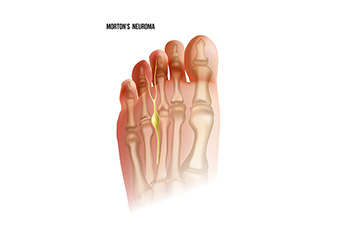
Plantar digital neuroma, commonly known as Morton's neuroma, is a painful condition involving the thickening of tissue surrounding one of the nerves leading to the toes. This condition typically develops between the third and fourth toes and causes sharp, burning pain and often a feeling of having a pebble in the shoe. Wearing high-heeled or tight shoes, repetitive stress, and certain foot deformities like bunions and hammertoes can contribute to developing a neuroma. To prevent plantar digital neuroma, it helps to wear well-fitted, low-heeled shoes with adequate toe room and cushioning. It is also beneficial to avoid activities that place excessive pressure on the ball of the foot. Regularly stretching, strengthening foot muscles, and maintaining a healthy weight can reduce the risk of Morton's neuroma. If you have pain between your toes, it is suggested that you consult a podiatrist who can accurately diagnose and treat this condition.
Morton’s neuroma is a very uncomfortable condition to live with. If you think you have Morton’s neuroma, contact one of our podiatrists of Family Foot Health Center. Our doctors will attend to all of your foot care needs and answer any of your related questions.
Morton’s Neuroma
Morton's neuroma is a painful foot condition that commonly affects the areas between the second and third or third and fourth toe, although other areas of the foot are also susceptible. Morton’s neuroma is caused by an inflamed nerve in the foot that is being squeezed and aggravated by surrounding bones.
What Increases the Chances of Having Morton’s Neuroma?
- Ill-fitting high heels or shoes that add pressure to the toe or foot
- Jogging, running or any sport that involves constant impact to the foot
- Flat feet, bunions, and any other foot deformities
Morton’s neuroma is a very treatable condition. Orthotics and shoe inserts can often be used to alleviate the pain on the forefront of the feet. In more severe cases, corticosteroids can also be prescribed. In order to figure out the best treatment for your neuroma, it’s recommended to seek the care of a podiatrist who can diagnose your condition and provide different treatment options.
If you have any questions, please feel free to contact our office located in Rogers and Berryville, AR . We offer the newest diagnostic and treatment technologies for all your foot care needs.
